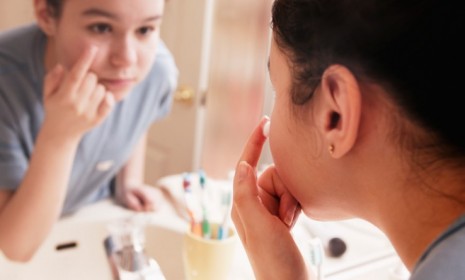The virus that could cure horrible teenage acne
Experts discover a benign skin virus that naturally preys on a pesky zit-causing bacterium, meaning safer and more effective skincare options could be on the way

A free daily email with the biggest news stories of the day – and the best features from TheWeek.com
You are now subscribed
Your newsletter sign-up was successful
The secret to zapping irritating acne may have been on our faces all along. Scientists at UCLA and the University of Pittsburgh have discovered that a common, benign skin virus naturally preys on a type of bacterium that causes nasty zits to form. Now experts think it could lead to groundbreaking acne-fighting treatments, and should prove welcome news for pimple-plagued teens everywhere. A guide to the discovery, and what it means for your face:
How do zits form?
Acne forms when tiny hair follicles become clogged with oil and dead skin, says Michelle Castillo at CBS News. When pores get backed up, bacteria like Propionibacterium acnes can cause infections that inflame the skin and result in zits. It's estimated that 85 percent of all people will experience acne at some point in their lives.
The Week
Escape your echo chamber. Get the facts behind the news, plus analysis from multiple perspectives.

Sign up for The Week's Free Newsletters
From our morning news briefing to a weekly Good News Newsletter, get the best of The Week delivered directly to your inbox.
From our morning news briefing to a weekly Good News Newsletter, get the best of The Week delivered directly to your inbox.
Why is acne worse for teens?
During puberty, a teenager's hair follicle glands begin growing larger. To help lubricate the skin, these glands produce an oily substance called sebum, and bacteria like P. acnes live inside the fatty acids of the oil. That's why teens are so susceptible to breakouts and why as many as 40 percent of them end up suffering from acne or acne scarring.
What did researchers learn about battling zits?
The report, published in the journal mBio, examines a type of virus called a bacteriophage that lives harmlessly on our skin. These bacteriophages, or phages for short, seek out P. acnes bacteria and "inject their genetic material into [them], forcing them to make more and more new phages until they burst," says Daniel J. DeNoon at WebMD. Now skincare experts think tapping these predatory viruses, which leave other cells alone, could hold the key to stopping zits dead in their tracks.
A free daily email with the biggest news stories of the day – and the best features from TheWeek.com
How would phages be more effective than current treatments?
Current acne treatment is based on various factors, including cleaning out the pores to remove sebum, using antibiotics to kill bacteria, reducing swelling with anti-inflammatory medicine, or using hormone treatment therapy for especially bad acne. These approaches all have their limitations: Antibiotics often fail, for example, because P. acnes can develop a natural resistance. Phages, which doctors hope to develop into a topical cream, offer a "more efficient approach because they are a natural predator, unlike a synthetic antibiotic," says Christopher Wanjek at LiveScience. That means acne-causing bacteria would be less likely to develop a natural resistance.
Sources: CBS News, HealthDay, LiveScience, WebMD
-
 Crisis in Cuba: a ‘golden opportunity’ for Washington?
Crisis in Cuba: a ‘golden opportunity’ for Washington?Talking Point The Trump administration is applying the pressure, and with Latin America swinging to the right, Havana is becoming more ‘politically isolated’
-
 5 thoroughly redacted cartoons about Pam Bondi protecting predators
5 thoroughly redacted cartoons about Pam Bondi protecting predatorsCartoons Artists take on the real victim, types of protection, and more
-
 Palestine Action and the trouble with defining terrorism
Palestine Action and the trouble with defining terrorismIn the Spotlight The issues with proscribing the group ‘became apparent as soon as the police began putting it into practice’